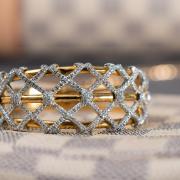Focus on three key areas to help your knees and hips last longer, say experts at Nuffield Health
Hips and knees are designed to last a lifetime, but injury, accidents, and osteoarthritis can leave joints worn out and feeling very painful.
There are three key areas to focus on to maintain joint health and reduce your risk of osteoarthritis to get the best performance out of your hip and knee joints, perhaps for many years to come:
1: Lighten the load.
There are many good reasons to lose weight, and looking after your joints is one of them. Hips and knees are load-bearing joints. The heavier you are, the more load they must bear and the faster they'll wear out.
Your hips or knees may even hurt when walking if you carry excess weight. You don't have to lose much to make a big difference.
For example, when you walk up or down a flight of stairs, the load on your knees is roughly seven times your body weight. If you're overweight, that adds up very quickly.
Losing just one stone will take around seven stone off your knee joint with every step.
2: Eat well for joint health.
Like a machine with moving parts, our body needs essential nutrients and oil to keep joints lubricated and healthy.
- Omega-3 has been linked to reduced joint pain and morning stiffness. Eat oily fish rich in omega-3 fats like salmon and mackerel twice a week.
- Vitamin E has antiinflammatory properties and healthy levels have been linked to lower risk of joint and bone cell damage. You'll get plenty by adding avocado, sunflower seeds, nuts and even lobster to your diet.
- Antioxidants are thought to slow the progression of arthritis inflammation. They're found in brightly-coloured berries, blueberries are particularly rich in antioxidants.
3: Strengthen your hips and knees with exercise.
The assumption that exercise damages your joints has been found to be false. In fact studies conducted over the past decade have shown that exercise helps to both build healthy cartilage and to build support around the joints, keeping them stronger for longer.
Excessive exercise however can cause your joints to wear out prematurely.
Many elite sports men and women find they have problems with their joints earlier in life than less active people, but that shouldn't put you off exercise.
Building strong, flexible muscle around your hips and knees will ensure the joints don't have to do all the work by themselves.
Meet the experts
If you or someone you care about is experiencing any of these symptoms, you may benefit from seeing your GP or a physiotherapist for a full assessment or come along to a FREE patient event at a hospital near you:
Nuffield Health Plymouth Hospital: 7 November - Meet our Experts on Hips and Knees. Call our Enquiries team to find out more and book your place: 01752 548993
Nuffield Health Exeter Hospital: 7 November - Meet our Experts on Hip Surgery. Call our Enquiries team to find out more and book your place: 01392 249767
For free advice on a variety of health concerns and conditions including joint health and pain: Nuffield Health Advice Hub: nuffieldhealth.com/article
OsteOarthritis - Key Facts
- Osteoarthritis is the most common form of arthritis. It is a degenerative disease and is often referred to as "wear and tear" of a joint as you get older.
- Osteoarthritis is painful as joints become stiff and inflamed when the smooth cartilage lining the joints gets damaged. Without the protection of cartilage, the rough surfaces of your bones rub together as you move, causing the pain that is all too common for sufferers. Simple, everyday things, like going for a walk or even getting dressed become difficult.
- There's no cure for osteoarthritis and it does get worse with time. However, joints can be replaced successfully, improving mobility and reducing pain.
- The damaged joint can be replaced with an artificial one, called a prosthesis - it can be made from a combination of metal, plastic or ceramic. This is a common procedure to relieve the pain of osteoarthritis and is a long-term solution for a worn-out joint. Last year alone, Nuffield Health carried out almost 4,000 knee replacements and almost 5,000 hip replacements.
Signs / Symptoms:
- Stiffness in the hip area following a period of inactivity
- Stiffness getting up in the morning which eases with 15 minutes of activity
- Pain or difficulty getting in/out of a car
- Difficulty and pain with putting shoes and socks on
- Pain during, or after periods of exercise or activity.



























